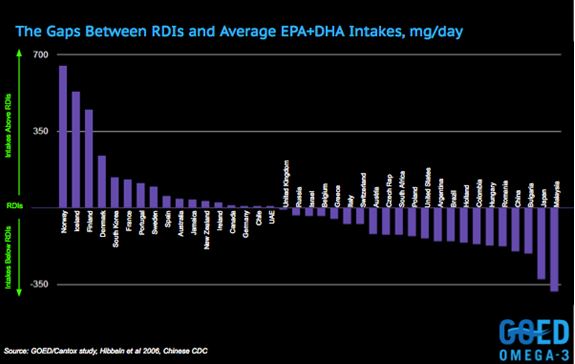News
Finally…. Government Opinions Catching Up with the Science
25 Aug 2014It was a good month for omega-3s last month when the European Food Safety Authority published its “Scientific Opinion on health benefits of seafood (fish and shellfish) consumption in relation to health risks associated with exposure to methylmercury” recommending that children and adults should try to consume at least two servings of seafood per week. […]

It was a good month for omega-3s last month when the European Food Safety Authority published its “Scientific Opinion on health benefits of seafood (fish and shellfish) consumption in relation to health risks associated with exposure to methylmercury” recommending that children and adults should try to consume at least two servings of seafood per week. This report comes on the heels of a similar recommendation from the U.S. Food and Drug Administration and Environmental Protection Agency in June (http://www.fda.gov/Food/FoodborneIllnessContaminants/Metals/ucm393070.htm).
The EFSA opinion stated:
“Consumption of about 1-2 servings of seafood per week and up to 3-4 servings per week during pregnancy has been associated with better functional outcomes of neurodevelopment in children compared to no seafood. Such amounts have also been associated with a lower risk of coronary heart disease (CHD) mortality in adults and are compatible with current intakes and recommendations in most of the European countries considered.”
“The observed health benefits of seafood consumption during pregnancy may depend on the maternal status with respect to nutrients with an established role in the development of the central nervous system of the foetus (e.g. docosahexaenoic acid (DHA) and iodine) and on the contribution of seafood (relative to other food sources) to meet the requirements of such nutrients during pregnancy. The health benefits of seafood consumption in reducing the risk of CHD mortality are probably owing to the content of n-3 LCPUFA in seafood.”
GOED is very happy to see these revised recommendations, as there is evidence that many consumers worldwide do not consume enough omega-3s (see graph below). And every government that has assessed mercury exposure as it relates to seafood has concluded that the benefits, a large portion of which are derived from EPA and DHA consumption, outweigh the risks associated with mercury exposure. Those risks can be further mitigated by consuming a variety of seafood (rather than the same thing every day) and/or consciously choosing species that are low in mercury contamination. This is important because consumers in many developed countries have slowly started to consume less fish as a result of the fears raised by governments and NGOs in the past and the public health impacts are potentially severe going forward.
As a matter of fact, a recent study published in the Journal of Health Economics (http://www.ncbi.nlm.nih.gov/pubmed/24992390) shows that in the U.S., the FDA’s old seafood advisory has caused a net loss of welfare to society because consumers have started to decrease their consumption of omega-3s and the losses from that outweighed the benefits of consuming less mercury.
Let’s hope the word gets out to consumers everywhere about the importance of EPA and DHA omega-3s.
Related news

Has ‘clean’ had its day?
22 Dec 2025
Wielding clean-label positioning and fortification as marketing levers is a dangerous strategy, and brands would be better off explaining the hows and whys of the ingredients in their products, say experts.
Read more
Celebrating the winners of the Fi Europe Innovation Awards 2025
3 Dec 2025
Food industry stakeholders celebrated as the winners of the Fi Europe Innovation Awards were announced at a ceremony in Paris.
Read more
Alternative protein startups pivot to B2B ingredients amid funding shift
27 Nov 2025
Alt protein startups are pivoting from consumer meat analogues to high-value B2B ingredients, driven by stronger investor interest, better margins, and clearer commercial pathways.
Read more
Walmart Marketplace’s record growth prompts search for UK sellers
26 Sep 2025
Walmart’s third-party e-commerce platform, Marketplace, has witnessed extraordinary growth – but a need for more product diversity has prompted the retailer to recruit UK sellers.
Read more
The winners of Vitafoods Europe Startup Challenge 2025 revealed
29 May 2025
Four startups – Yomio Drops, PFx Biotech, Revobiom, and Favamole – took top prizes at this year’s Vitafoods Europe Startup Challenge awards.
Read more
East takes on West in the fight for future food flavours
30 Apr 2025
Asian and South American flavours are now key components on global menus, driven by a growing global appetite for culinary mashups.
Read more
Food companies urged to bring ‘joy’ and urgency to healthy food mission
14 Mar 2025
For too long, businesses have treated health and sustainability as separate agendas – but there is growing evidence to show diets that benefit human health can also enhance that of the planet, say experts.
Read more
Entries open for inaugural Vitafoods Europe Innovation Awards
29 Jan 2025
Entries are open for the inaugural Vitafoods Europe Innovation Awards, celebrating the ingredients, finished products, partnerships, and initiatives redefining the nutraceutical landscape.
Read more
Paris Olympics: Food and beverage brands champion health, fun, and sustainability
5 Aug 2024
Food and beverage brands are aligning with the Paris Olympics 2024 Food Vision, which emphasises sustainability, local sourcing, and plant-based diets.
Read more
Natural Remedies: Bringing health and happiness via validated branded ingredients
18 Apr 2024
Natural Remedies is an internationally renowned botanical healthcare company committed to advancing the field through rigorous research and the development of clinically validated Branded Ingredients. Guided by our foundational principle of ‘BEING USEF...
Read more
